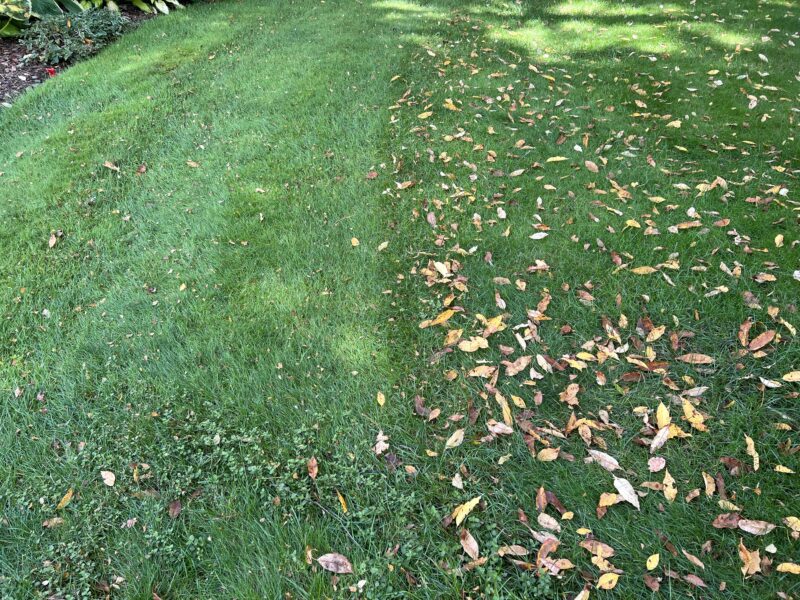

It’s certainly cooled down and there’s even been some rain. The pumpkins are out, the apples nearly harvested and this weekend is the annual Hudson Valley Garlic Festival, one of the largest in the East. It is indeed fall and one where gardeners need to keep the summer and its attendant drought in mind.
It’s always a good idea to keep a seasonal to-do list, then prioritize the list and fit all the work into your schedule. Your fall list should include everything you need to get the landscape ready for winter, to plant for next year, and to make sure that all’s well with your gardens.
You’ve seen me use the term “garden sanitation” over and over, and cleaning up your garden in the fall is critical to reduce your disease and rodent issues for next year. As soon as you can, get all the finished veggie plants out of the garden and into the compost pile. Left behind, the vines, stems and fallen fruits (yes tomatoes are fruits) need to be removed from the garden as these can be the primary inoculants for next year’s diseases when left behind. Most critical are the tomato plants and the vines of cukes and melons. Once removed consider putting down seed for a cover crop to renourish the soil.
But garden sanitation doesn’t stop at the veggie garden. Foliage that drops from rose plants should also be removed to reduce the potential for disease spread from these leaves, and even some leaf picking from plants still producing flowers is in order if you notice discoloration and spotting. The drought has cut down on mildew issues but if you’ve got garden phlox that has signs of powdery mildew then these plants need to be cleaned up as well. If they’re still productive and you’re not ready to cut them back then at least give them a spray of neem oil or horticultural oil to suppress the mildew.
Rodents like voles are searching for food and leaving garden debris or wood piles near your gardens only gives them shelter and places to nest. The same holds true with mice. I had the good fortune of having a black cat roaming the property since early summer, and that explains my summer lack of voles. I know they’re still around, though, as I was standing in the perennial border collecting seed from a Thalictrum and a vole ran between my legs. The mousetraps baited with small pieces of apple are back in the garden. The black cat still lurks and hunts.
If you mow your own lawn I hope you’re using a mulching mower. Most mowers can be converted to mulching simply by using the right blade, but some mowers also need a mulching kit, which keeps the grass clippings in the deck longer so they are cut several times. I’m still amazed when I mow how not only the grass clippings disappear but any fallen leaves get the same shredding treatment and seem to disappear as well.
However, if you don’t keep your mulching blades sharp and your mower deck cleaned the mulching blades won’t be of much help. Wet or damp grass, even when finely cut by mulching blades, will result in your mower’s deck getting clogged as the “lifting” effect of the blades is severely reduced by the grass that gets gunked up.
Some mowers have a port on the deck where you can attach a garden hose. With the water on and the blades engaged most of the deck gets cleaned most of the time. I still check carefully after each cutting to make sure the underside of the deck is clean and free of debris. If the air flow is disturbed and grass and leaves don’t get properly shredded, you’ll notice clumping and clods of grass left behind as you mow.
Keep an eye on your lawn people also if they’re using mulching mowers. Signs of greenish black clods and wads of grass on your lawn is a good sign that their blades are dull and their decks are clogged.
This is the main season for perennial weed control on your lawn. In most cases I think it’s best to have a professional do this work, and you should only need this done every three to four years. In most cases a well-kept lawn only needs spot treatments but a good survey of your lawn by a professional will be a clue as to what needs to be done and how.
Yes, you can buy granular herbicides and liquid herbicides to manage your weeds. It can be tricky, though, and there is always the danger of damaging other plants with what you apply either with a spreader or sprayer. If at all possible, let a pro do this work but make sure you know what they are using and what to expect. And once again: It should not be necessary to do weed control every year if you or your landscaper is doing spot treatments several times a year.
I’ve had an ongoing battle with ground ivy in my lawn for years. I’ve tried a number of organic treatments, but this tenacious weed always seems to win the battle. This year I’m reluctantly using a chemical herbicide with the hope that this will make this weed manageable again with organics.
With our long growing season, the next four to six weeks are a great time for dividing perennials. The general rule is that late-summer-flowering perennials get divided in early spring while spring-flowering perennials can be divided now or after they flower in the spring. Curious gardeners should experiment. Still time to rejuvenate peonies that have been showing reduced flowering. Just make sure it’s not a lack of sunlight that’s causing this as opposed to the plant needing division and restarting. Peony planting should be finished before the end of the month.
Test your soil’s pH (acidity). I do at least four tests every fall using an inexpensive testing kit. I see little change from year to year and organic gardeners should see the same. On the other hand, if you use chemical fertilizers in your gardens and on the lawn, then soil testing is even more important as these chemicals can change the pH where organics generally don’t. Soil pH can be easily and inexpensively adjusted with the use of a product called Solu-Cal. It’s much easier to use than old-fashioned granular or powdered lime, and it works much, much faster. One bag covers 10,000 square feet.
Home garden and lawn nutrient tests, on the other hand, are pretty useless. If you think you have a nutrient issue in your garden beds or in your lawn you can either contact Suffolk Cooperative Extension at 631-727-4126 to get soil testing instructions and kits or ask at your local garden center to see if they can send out soil samples for testing.
This is also the prime season for planting new trees and shrubs, especially if they have been container grown. Some trees, especially larger ones that are balled and burlapped, may be better suited for a planting once the foliage has dropped, and there are trees that prefer spring planting. Again, ask your local garden center (and no, I don’t consider the big box stores as local garden centers) or your landscaper as they can be very helpful here.
If you’re planting trees and shrubs for fall color — let’s say a maple or two — do some research. There are many varieties of maples, and choosing the wrong one can result in fall foliage colors you didn’t want. Some maples will produce yellow fall colors while others will produce reds and oranges. Do your homework.
For bulb planting use this simple guide: tulips first, daffodils last. Deer won’t eat your daffodil bulbs, but deer and squirrels will feast on your tulip bulbs. And yes, deer will dig them out of the ground. I do have one solution, but it’s only temporary. It’s a repellent called Bobbex-R. Use the concentrate as a bulb dip and it will protect your tulips, lilies and other bulbs from being eaten — but only for one year. Unfortunately, once planted these bulbs can’t be “dipped” again. For subsequent years you may be able to use Bobbex-R as a soil soak in the areas where these bulbs are planted, but I can’t vouch for this method.
When using the R formulation of Bobbex be very, very careful to wear gloves and eye protection. The X formulation is the only one that contains castor oil, which is one of the very few repellents that works against voles.
Hoses are much easier to coil and store on a warm and sunny day. Wait until it gets colder and it becomes a true hassle.
Did you buy or are you getting a battery-operated chain saw? Remember that even this type of chain saw needs chain/bar oil and forgetting to refill the chain oil reservoir can wreck the blade, bar and the saw.
Sharpen your hand pruners and loppers. This ensures sharp, clean cuts that will aid in healing.
Have garden machines that run on gasoline? At this time of the year it’s always a good idea to add a gasoline stabilizer every time you gas up. This eliminates the possibility of water building up in the tank or gas line and gives you a bit of protection if you forget to winterize the machine.
Buy garlic bulbs now and get them planted by the end of the month. Plant cloves two inches deep for most varieties and 4 to 6 inches apart, the pointed end always facing up.
The drought isn’t over. Water all new plantings well into November. The weather wizards are calling for a warm winter with average precipitation. It was supposed to be a cool and damp summer. In my book, a warm winter with average precipitation could mean ice storms. Enough said?
The Philadelphia Flower Show is back in March, and this year it’s back indoors. Can’t wait. Keep growing.
 More Posts from Andrew Messinger
More Posts from Andrew Messinger